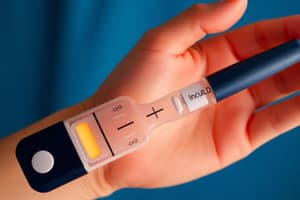Podcast
Questions and Answers
What is the primary cause of Type 1 diabetes?
What is the primary cause of Type 1 diabetes?
- Autoimmune destruction of pancreatic islet cells (correct)
- Deficiency of insulin secretion
- Insulin resistance in target tissues
- Long term damage to various organs
Which type of diabetes is associated with an absolute deficiency of insulin?
Which type of diabetes is associated with an absolute deficiency of insulin?
- Type 1 diabetes (correct)
- Maturity-onset diabetes of the young (MODY)
- Gestational diabetes
- Type 2 diabetes
What is the main difference between Type 1 and Type 2 diabetes?
What is the main difference between Type 1 and Type 2 diabetes?
- Type 1 presents in children, while Type 2 usually presents in adults.
- Type 1 is not associated with hyperglycemia, while Type 2 is.
- Type 1 involves insulin resistance, while Type 2 involves autoimmune destruction.
- Type 1 results from lack of compensatory insulin response, while Type 2 results from defects in insulin secretion. (correct)
What characterizes the chronic hyperglycemia in diabetes mellitus?
What characterizes the chronic hyperglycemia in diabetes mellitus?
Which condition results from a combination of insulin resistance and inadequate compensatory insulin response?
Which condition results from a combination of insulin resistance and inadequate compensatory insulin response?
What is the primary metabolic disorder in diabetes mellitus?
What is the primary metabolic disorder in diabetes mellitus?
What is the natural history stage when a patient has a progressive defect in insulin secretion but has not yet developed clinical diabetes?
What is the natural history stage when a patient has a progressive defect in insulin secretion but has not yet developed clinical diabetes?
Which antibodies are associated with type 1 diabetes autoimmunity, even though they may be undetected in about 10% of cases?
Which antibodies are associated with type 1 diabetes autoimmunity, even though they may be undetected in about 10% of cases?
What percentage of pancreatic β-cells must be lost for a patient to become sufficiently insulinopoenic and develop hyperglycemia?
What percentage of pancreatic β-cells must be lost for a patient to become sufficiently insulinopoenic and develop hyperglycemia?
Which gene is associated with type 2 diabetes in adults, as mentioned in the text?
Which gene is associated with type 2 diabetes in adults, as mentioned in the text?
What is the significance of transient remission (honey moon) in the natural history of type 1 diabetes?
What is the significance of transient remission (honey moon) in the natural history of type 1 diabetes?
What is the function of matured insulin stored in vesicles?
What is the function of matured insulin stored in vesicles?
Which molecule allows glucose to enter the islet cell?
Which molecule allows glucose to enter the islet cell?
What does insulin do to lipid synthesis?
What does insulin do to lipid synthesis?
Which environmental factor is NOT associated with the etiology of Type 1 Diabetes Mellitus?
Which environmental factor is NOT associated with the etiology of Type 1 Diabetes Mellitus?
What is a common clinical presentation of Type 1 Diabetes Mellitus?
What is a common clinical presentation of Type 1 Diabetes Mellitus?
What might be a consequence of frequent nocturia in a child with Type 1 Diabetes Mellitus?
What might be a consequence of frequent nocturia in a child with Type 1 Diabetes Mellitus?




